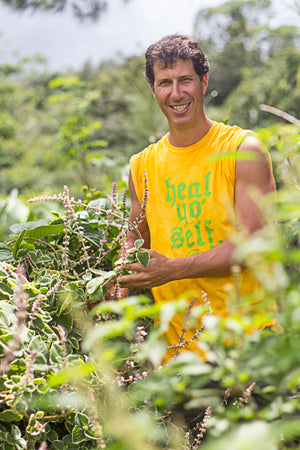Herbs for Healing
July 19, 2017

Medicinal Plants can promote wellness
KILAUEA — Doug Wolkon was tunnel-visioned in his pursuit of vitality when he moved to Kauai eight years ago with his wife, Genna.
Now, the two own and operate Kauai Farmacy, where they grow, blend and sell medicinal teas, tinctures, salves and powders.
But they haven’t always been herbalists.
Back on the Mainland, Wolkon said the two were living a “fast-lane life”; he was in real estate finance, she was an industrial designer. They needed a change of pace.
“When we moved here, I still had 30 extra pounds on me and I’d lost my intuition and willpower,” Wolkon said. “We were on this healing path.”
Medicinal plants were introduced to them shortly after moving to the Garden Isle, and the pair used them to create wellness in their bodies and balance in their lives.
It all started with noni tea.
“We read about it and someone recommended using the noni leaf, wild crafting it and putting it in our water,” Wolkon said. “That was the first connection we made.”
The tree’s fruit and leaves have been shown to have hypoglycemic properties, according to a 2016 study published in Pharmacognosy Journal.
It is used in various parts of the world to treat problems with eyes, skin, gums, and the throat, as well as respiratory and gastrointestinal problems, according to the study.
Wolkon can attest to the healing powers of noni, and many other healing plants — 70 different species of which have been planted at Kauai Farmacy.
“We’ve been drinking teas for thousands and thousands of years,” Wolkon said. “It’s more balanced and more gentle than eating the fruit in a lot of ways.”
Lemongrass, ginger, ashwaganda, hibiscus, and tulsi are just a few of the plants in their herb gardens that are harvested, dried and processed on location.
Each of them has a different specialty, from anti-inflammatory properties to targeting gastrointestinal, skin and hormonal issues.
And while each has their known uses, Wolkon said the healing properties of the plants differ depending on the culture of the people and location.
“It’s all based on your diet, lifestyle and sleep patterns; everything that’s in our culture because the plants interact with what’s going on in your body,” he said.
Using the properties of ancient Chinese medicine, Wolkon explained medicinal plants, especially in tea form, break up energy blockages in the body - meaning they target toxins and acidity.
“We have thousands of words to describe blocked energy, but these teas go in and alkaline the blockages, chemically speaking. Once the body goes alkaline, it spits the acid out,” Wolkon said.
And an alkaline body is Wolkon’s key to wellness.
Trial and error is how Wolkon and his wife learned how to blend their own wellness teas. He said beginners might experience headaches and lethargy if they overdo it on tea strength or quantity. It’s also possible to experience vomiting, diarrhea, fever rashes as detoxification symptoms.
“The key to (relieving) these side-effects are typically rest and water,” Wolkon said. “Drink plenty of water and detox.”
Depending on individual bodies, medicinal plants will react a bit differently for everyone. Wolkon suggests starting slowly with loose-leaf teas and gradually stepping up strength and quantity.
Wolkon’s other secret to wellness success is integrating medicinal plants into a lifestyle, not just sporadically indulging.
“It’s about integration with your lifestyle. This is easy to understand and integrate, it’s as simple as simple gets, and for health, that’s critical,” he said.

